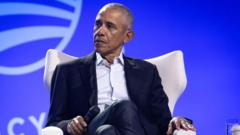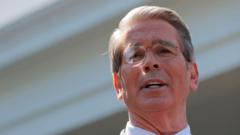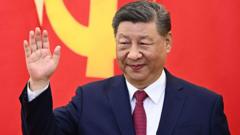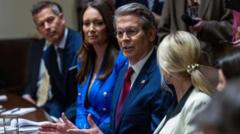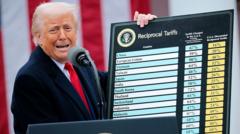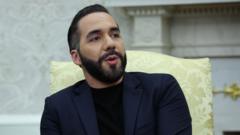In an Oval Office meeting with President Trump, El Salvador's leader Nayib Bukele declared he would not facilitate the return of Kilmar Armando Abrego Garcia, a deportee involved in a Supreme Court case, stating it would be akin to smuggling a "terrorist" into the U.S.
El Salvador's President Refuses to Retrieve Wrongly Deported Man Amid Legal Controversies

El Salvador's President Refuses to Retrieve Wrongly Deported Man Amid Legal Controversies
Nayib Bukele's decision highlights tensions between U.S. immigration policy and international diplomacy.
El Salvador's President Nayib Bukele made a bold declaration during a meeting with U.S. President Donald Trump, stating he would not assist in the return of Kilmar Armando Abrego Garcia, a man who claims to have been wrongfully deported to El Salvador. Bukele further emphasized that complying with the request would equate to smuggling a "terrorist" into the United States.
This decision comes against the backdrop of a contentious legal issue currently before the Supreme Court, which has previously described the deportation of Abrego Garcia as an "administrative error." Despite this ruling, President Trump has publicly defied the order, creating friction in the relationship between the two nations.
During the meeting in the Oval Office, Trump appeared to approve of Bukele’s remarks, illustrating the personal rapport between the two leaders while also underlining the complexities of U.S. immigration policy and its repercussions abroad. Zolan Kanno-Youngs, a White House correspondent, remarked that this interaction encapsulates a moment of a foreign leader catering to Trump’s demands during a high-profile visit.
In addition to this immigration controversy, other significant political developments occurred concurrently in the United States. Harvard University rejected policy changes put forth by the Trump administration, signaling impending confrontations with the White House. Furthermore, Trump hinted at upcoming tariffs on imported computer chips and pharmaceuticals, while mentioning potential relaxations on tariffs related to auto parts.
The geopolitical implications of Trump's tariffs on China may create ripple effects in Europe, where cheap Chinese goods could disrupt local industries. In response to these challenges, the British government announced measures to alleviate pressures on local exporters by reducing tariffs and providing new financial support.
As these economic strategies unfold, the interplay between domestic policies and international relations continues to present a complex landscape for both the U.S. and its various global partners.




